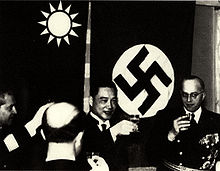To drive home the point about who really started the Sino-Japanese War in 1937, I quote from historian James Crowley’s seminal study Japan’s Quest for Autonomy: National Security and Foreign Policy 1930-1938, published by Princeton University Press in 1966:
Again,
Your view is that someone smacks you with a baseball bat, takes your wallet, and says he'll let you have your credit cards back if you give him a blow job, then that's a great deal.
This is what Japan offered China.
The burning of Changsha was the final straw for Wang Jengwai, the vice president of the Nationalist government and a longtime associate of Chiang Kaishek’s. Following the Nationalists’ senseless killing of at least 20,000 fellow Chinese at Changsha, Jengwai defected to the Japanese and later became the leader of one of the pro-Japanese governments set up by the Japanese in China.
Here's a picture that should tell you all you need to know about Wang...

He was right up there with Marshall Petain and Vikund Quisling...
In March 1944, Wang left for Japan to undergo medical treatment for the wound left by an assassination attempt in 1939.[23][24][25] He died in Nagoya on 10 November 1944, less than a year before Japan's surrender to the Allies, thus avoiding a trial for treason. Many of his senior followers who lived to see the end of the war were executed. Wang was buried in Nanjing near the Sun Yat-sen Mausoleum, in an elaborately constructed tomb. Soon after Japan's defeat, the Kuomintang government under Chiang Kai-shek moved its capital back to Nanjing, destroyed Wang's tomb, and burned the body. Today, the site is commemorated with a small pavilion that notes Wang as a traitor.[

